Today, I plan to prepare a simple home-cooked meal: Steamed Chicken with Chinese Sausage.
After having so much rich and extravagant food during the festival season, it would be refreshing to give our taste buds a break from the excessive stimulation.
Steamed Chinese Sausage with Chicken is a traditional everyday Chinese meal made with boneless chicken, Chinese sausage, dried shiitake mushrooms, cloud ears mushrooms, and Chinese red dates. Cantonese families have enjoyed this classic dish for generations, and I, too, have been eating it since I was young.
Note: This post may contain affiliate links. Please read my privacy policy for more info. I may receive commissions for purchases made through links in this post. As an Amazon Associate, I earn from qualifying purchases.
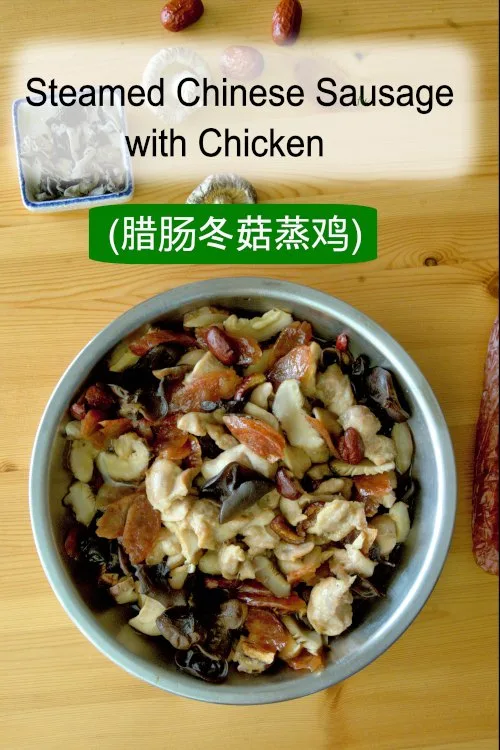
1. How to prepare steamed Chinese sausage with chicken
a. Chicken
To begin with, cut the chicken meat into bite-size pieces. You can use boneless chicken thighs or chicken breast, according to your preference.
Marinate the chicken with common seasonings in Chinese cooking, such as light soy sauce, Chinese rice wine (or dry sherry), sesame oil, salt, and cornstarch. The full seasoning list is in the recipe, but you can also make your twist by adding some dark soy sauce and white pepper.
Cornstarch helps to make the chicken more velvety after steaming. You can also add some oyster sauce if you like. I added some vegetable oil to the marinade since chicken meat is relatively low in fat.
One crucial aspect of this dish is the use of fresh chicken meat. Steaming is a gentle cooking method that enhances the freshness of the ingredients as opposed to stir-frying or baking. The steaming process accentuates the subtle variation between the taste of frozen and fresh chicken, making it more noticeable.
b. Chinese sausage
The Chinese sausages (lap cheong/ 腊肠) should be blanched in boiling water for 30 seconds before cutting into slices. Blanching them loosens the casing, making it easier to remove the sausage from it.
Once blanched, the sausages should be sliced thinly and diagonally into thin pieces.
c. Dried shitake mushrooms
Another essential ingredient for this recipe is dried shiitake mushrooms. The mushrooms must be rehydrated before use. To do this, soak them in water until they are fully hydrated and soft. Then, cut away the tough stems and slice the mushrooms thinly.
The time needed for mushrooms to become soft depends on their size and thickness. To speed up the process, I soak them in hot water. Another trick is to place a heavy object, like a ceramic bowl, on top of the mushrooms to ensure they are fully submerged in the water.
Once the mushrooms have softened, remove the stems and slice them into thick slices.
There is a significant difference in flavor between dry and fresh shiitake mushrooms. Dry shiitake mushrooms have a more intense flavor, so they should not be substituted with fresh mushrooms.
d. Other secondary ingredients
Other supporting ingredients are dried red dates 红枣, cloud ear fungus 云耳, and goji berries 杞子.
Dried red dates
I used scissors to cut the dried red dates without soaking them, as the dates were quite soft. However, if you have larger and harder dates, soak them briefly in water before cutting them into smaller pieces. Make sure to remove the seeds from the dates. Dried red dates taste slightly sweet, and their flavor blends well with all other ingredients.
Cloud ear mushrooms
Cloud ear mushrooms, also known as cloud ear fungus, can be substituted with wood ear mushrooms if unavailable. However, wood ear mushrooms 木耳 are larger and thicker, so you must cut them into smaller slices after soaking. The cloud ear fungus is relatively smaller, so you can leave them as they are.
Both types of fungus will expand in water and become several times larger in size after rehydrating. They absorb water quickly and will be fully rehydrated in less than half an hour. This is in contrast to dried shiitake mushrooms, which can take more than an hour to rehydrate. Both types of fungus have a slippery and crunchy texture, which differs from the texture of the sausage and chicken in the dish.
Goji berries
There is one more ingredient that I’m not using today, which is goji berries. If you have them, wash them and soak them in water briefly to make them soft. Then, squeeze out all the water, and they will be ready to use. Goji berries have a mild flavor, so their absence won’t significantly impact the taste.
Note: Most of the abovementioned ingredients are usually available in Asian markets.
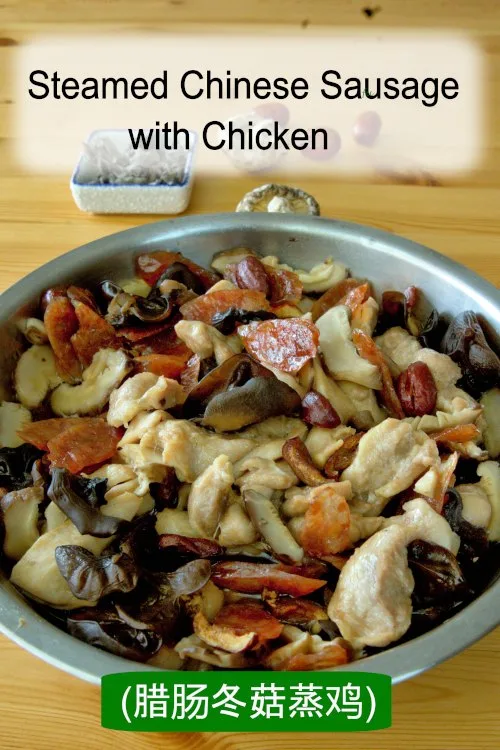
2. Steam the sausage, chicken, and the rest
- Once you have all the required ingredients ready, place the marinated chicken pieces and all other ingredients on a steaming plate. A stainless steel steaming plate is recommended as it is an excellent conductor of heat preferred by most Cantonese families. However, if you prefer a ceramic plate, that is fine too. Just note that you may need to steam the chicken slightly longer to ensure it is cooked.
- If you do not have a steamer, you can use a large wok with a trivet and a wok cover to set up a makeshift steaming station.
- Steam the ingredients for 15-20 minutes over high heat until thoroughly cooked.
- Once it is ready, remove it from the steamer, and the delicious steamed chicken with Chinese sausage and mushrooms is ready.
- You can sprinkle chopped green onions (spring onions) on top of the chicken and sausages as an optional garnish.
Remember to prepare plain white rice to serve together, as it perfectly complements the steamed sausage and chicken flavors.
Note: If you have any leftover Chinese sausage and preserved Chinese meat, you can use them to make a popular dish called Lap Mei Fan ( preserved meat rice.) in a clay pot. However, I won’t make this dish this time because I do not have all the necessary ingredients.
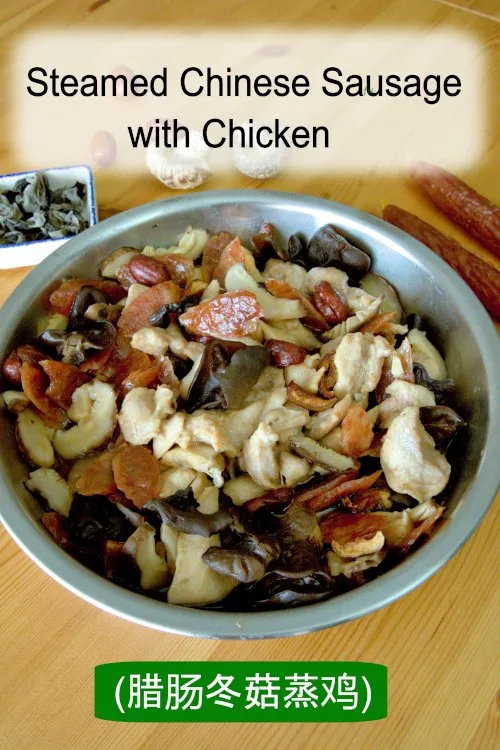
3. Other dishes related to this Chinese recipe
If you enjoy this Cantonese steamed chicken recipe with Chinese sausage, consider using Chinese sausage in other recipes. Here are my top picks.
- If you are a fan of fried rice, try this recipe for Chinese sausage fried rice. It is easy to make and tastes deliciously with the sausage.
- Steaming is a simple and healthy cooking technique to prepare various dishes. You can try the traditional steamed egg recipe, which includes salted egg and century egg.
Steamed Chicken with Chinese Sausage
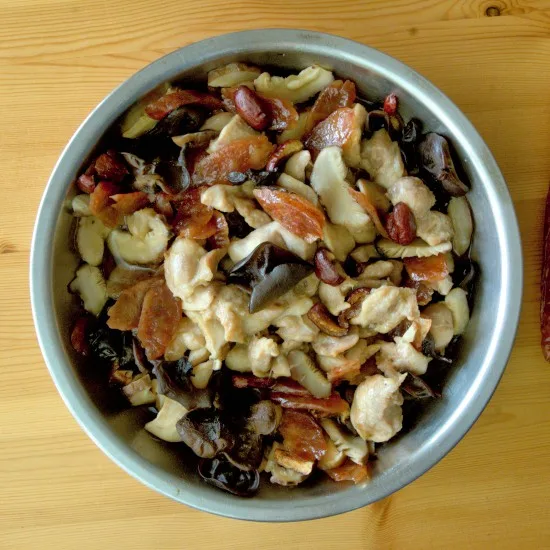
A classic Cantonese dish bursting with the flavors of Chinese sausage, chicken, mushrooms, and cloud ear fungus.
Ingredients
Ingredient A (marinate the chicken)
- 400g chicken meat (breast or thigh), cut into bite-size
- 1 tbsp light soy sauce
- 1 tbsp sesame oil
- 1/4 tsp salt
- 1 tbsp oyster sauce
- 1 tbsp Shaoxing wine
- 1/2 tbsp cornstarch
- 1 tbsp vegetable oil
Ingredient B
Instructions
Preparation:
- Cut the chicken meat into bite-size pieces.
- Marinate the chicken with Ingredient A.
- Blanch the Chinese sausages in boiling water for 30 seconds. Remove the sausage casing. Sliced thinly and diagonally into thin pieces.
- Rehydrate the dried shiitake mushrooms by soaking them in water. Then, cut away the tough stems and slice them thinly.
- Cut the dried red dates to remove the seeds.
- Rehydrate the cloud ear mushrooms just like the dried shitake mushrooms.
Steam the sausage, chicken, and the rest
- Place all the ingredients on a steaming plate.
- Steam for 15-20 minutes over high heat until thoroughly cooked.
- Once it is ready, remove it from the steamer.
Recommended Products
As an Amazon Associate and member of other affiliate programs, I earn from qualifying purchases.
-
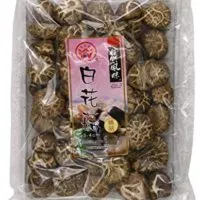 Havista Dried Premium Flower Shiitake Mushrooms, 6 Ounce
Havista Dried Premium Flower Shiitake Mushrooms, 6 Ounce -
 JQ Naturally Chinese Dried Dates Big Jujube Red Dates Organic Healthy Food 2 LB As a Snack As a Baking Or Make Tea
JQ Naturally Chinese Dried Dates Big Jujube Red Dates Organic Healthy Food 2 LB As a Snack As a Baking Or Make Tea -
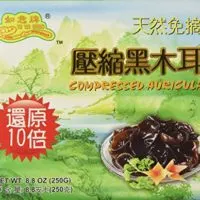 Premium Dried All Natural Compressed Chinese Auricularia Black Fungus Mushroom (Black Wood Ear Mushroom) - 8.8 Oz -- 10 Times Volume Yield After Soaking
Premium Dried All Natural Compressed Chinese Auricularia Black Fungus Mushroom (Black Wood Ear Mushroom) - 8.8 Oz -- 10 Times Volume Yield After Soaking -
 Kam Yen Jan Chinese Style Sausage 12oz (Pack of 3)
Kam Yen Jan Chinese Style Sausage 12oz (Pack of 3)
Nutrition Information:
Yield:
3Serving Size:
1Amount Per Serving: Calories: 459Total Fat: 26gSaturated Fat: 6gTrans Fat: 0gUnsaturated Fat: 17gCholesterol: 133mgSodium: 1024mgCarbohydrates: 13gFiber: 2gSugar: 8gProtein: 43g
This data was provided and calculated by Nutritionix on 2/21/2024

ANNA
Saturday 24th of February 2024
I love your recipes. Reminds me of home and what I used to eat as a child. So easy to follow. Keep up the good work.
Jennifer Holdcroft
Saturday 24th of February 2024
Happy New Year!Thank you! I will be making this for Sunday dinner. It looks very warming.
KP Kwan
Saturday 24th of February 2024
Hi, this is KP Kwan. Thank you for reading my recipe. Please feel free to ask any questions or leave comments. I’ll respond as soon as possible.